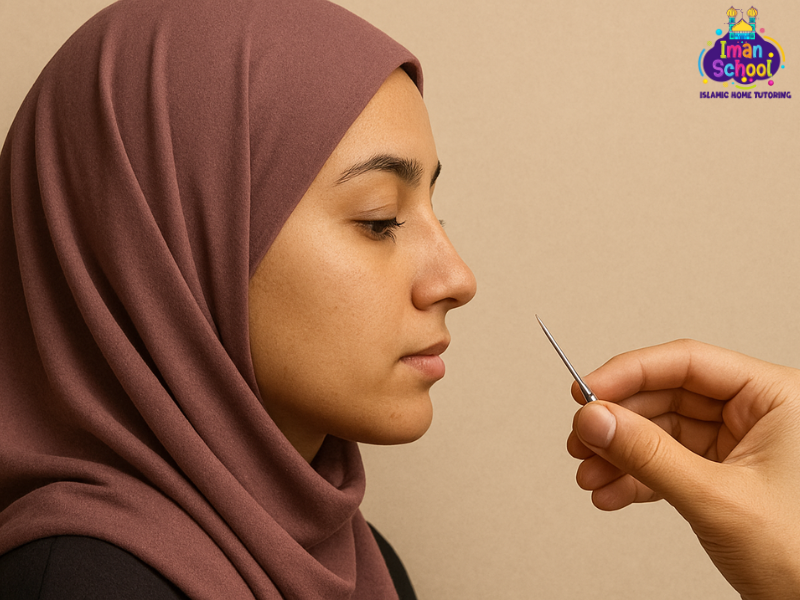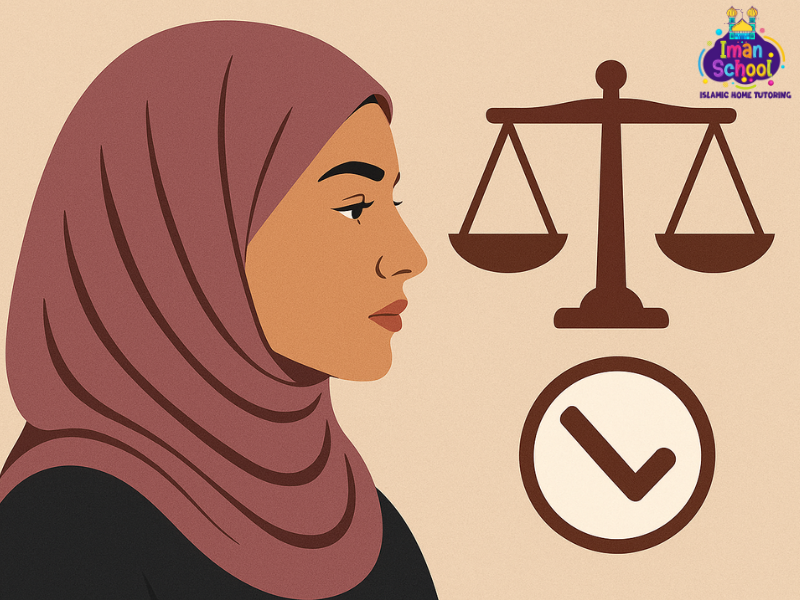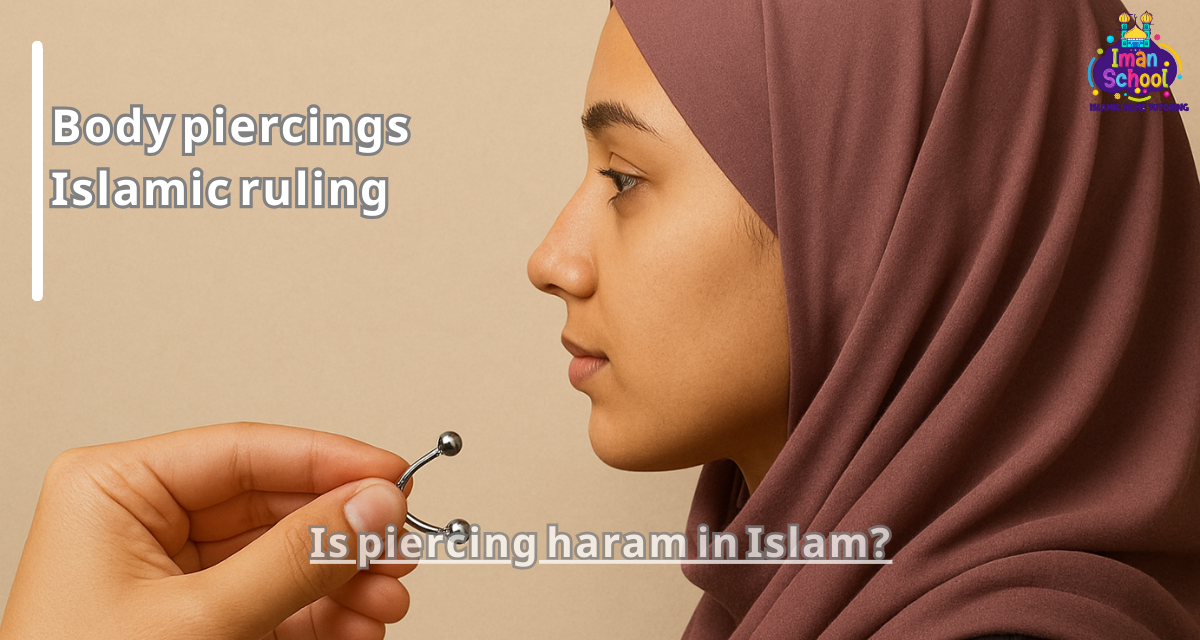The topic of body piercings Islamic ruling is a subject of frequent inquiry for Muslims, particularly in Western countries like the US, Canada, the UK, and Australia, as well as in Arab nations like the UAE, Qatar, and Oman. As a form of personal expression, piercings bring up questions about adornment, modesty, and the permissibility of body modification in Islam. This article will provide a detailed look at the scholarly views on piercings, addressing the key principles and nuances that govern this topic.
What is the general Islamic view on body piercings?
The general Islamic view on body piercings is not a simple "yes" or "no." The ruling is often tied to the specific location of the piercing, the gender of the person, and the cultural context. However, a key distinction is made between piercings that are part of a long-standing, widespread cultural practice for women (such as ear and nose piercings) and those that are not. For the latter, the general view is that they are either disliked (makrooh) or forbidden (haram). This is the foundation of the discussion on whether is piercing haram in Islam.

Read More: Laser hair removal Islamic ruling
Why is there a difference of opinion among scholars regarding this topic?
The difference of opinion stems from the lack of a direct, explicit verse in the Quran or a clear Hadith that forbids all forms of piercing. The prohibition is often derived through analogy to other matters, such as tattoos or a broader principle of avoiding unnecessary harm and imitating immoral or non-Muslim cultures. This reliance on analogical reasoning (qiyas) and the consideration of different cultural norms leads to a variety of scholarly views on the body piercings Islamic ruling.
What is the key principle in Islam that governs body modification?
The key principle that governs body modification is the prohibition against "changing Allah's creation" (Is it haram to change Allah's creation?), which is mentioned in the Quran.
This principle is most often applied to permanent, irreversible modifications made for no medical reason, such as tattooing. Most scholars argue that since piercings can be temporary (by removing the jewelry) and the body can heal, they do not fall under this strict prohibition, but rather under the principles of adornment and societal norms.
How do cultural customs and 'urf (local habits) influence the ruling?
Cultural customs, or 'urf, play a significant role in determining the permissibility of piercings. Actions that are considered commonplace and a form of adornment for women in a specific Muslim society are often considered permissible. Conversely, a piercing that is viewed as strange, vulgar, or imitative of a non-Muslim or immoral subculture may be considered impermissible. This is why a piercing that is common in one country might be viewed differently in another.
Read More: Fake nails Islamic ruling
Are ear piercings permissible for Muslim women?
Yes. Ear piercing Islamic ruling is that it is permissible for Muslim women. This is based on the fact that it was a well-known and accepted form of adornment for women during the time of the Prophet Muhammad (peace be upon him). There are also narrations mentioning women wearing earrings. Therefore, ear piercing is considered a part of a long-standing Islamic tradition of female adornment. The permissibility also extends to multiple ear piercings as long as they are within the earlobe itself and a common practice for women.
What is the Islamic ruling on nose piercings for women?
The nose piercing Islam ruling is a point of scholarly debate. While some scholars hold the view that it is a form of changing creation and therefore impermissible, the majority view is that it is permissible for women. This is because nose piercing has been a long-standing tradition of adornment in many Muslim cultures throughout history, including those in parts of the Indian subcontinent, the Middle East, and Africa.
Because it is a common custom, it does not fall under the prohibition of imitating non-believers. This is why many scholars consider it a halal piercing for women and that it's permissible to wear a nose ring in Islam.
Are all other body piercings, such as belly buttons or tongues, considered haram (forbidden)?
Generally, yes. Other piercings, such as those on the belly button, tongue, lips, or eyebrows, are considered haram or impermissible by the vast majority of scholars. This is based on two main reasons:
-
They are not part of an established Islamic tradition of adornment for women.
-
They are often associated with cultures that are not Islamic or are considered immoral.
Therefore, questions like is tongue piercing haram and belly piercing in Islam are almost always answered with a prohibition, as are Are face piercings haram? which generally do not include the nose.
The ruling falls under the general Islamic ruling on tattoos and piercings which focuses on a case-by-case analysis based on a set of criteria.
Read More: Islamic ruling on tattoos
Why is body piercing generally considered impermissible for men in Islam?
For men, the general ruling on body piercing is that it is forbidden (haram). The primary reason is that piercings, with the exception of temporary religious or cultural adornment in some traditions, are a form of female adornment. For men to adopt female forms of adornment is prohibited in Islam, as it is a form of gender imitation. This is a clear principle of Islamic ruling on male adornment.

Does a piercing prevent water from reaching the skin during Wudu or Ghusl?
This is a key practical question regarding wudu with piercings. For Wudu (ablution) and Ghusl (ritual bath) to be valid, water must reach all parts of the body that are being purified. Therefore, the jewelry in the piercing must be moved or removed to ensure water reaches the skin in the pierced area. If the piercing is new and cannot be removed, one must be careful to move the jewelry to allow water to reach the skin. The general consensus is that as long as water reaches the skin, Wudu and Ghusl are valid.
Learn More: Islamic Ruling on Eyebrows
The best online school to provide Shari'ah and Fiqh rulings
For anyone seeking a deeper understanding of Islamic law and a direct answer to questions like the body piercings Islamic ruling, it is essential to learn from qualified scholars. Iman School provides authentic online courses in Islamic law and Fiqh, taught by certified teachers. Our courses cover complex topics and give you the tools to understand the rulings directly from their sources.
Get Started: Quran Female Teacher in USA
Is a piercing considered a form of imitating disbelievers or immoral people?
This is a key factor in the permissibility of a piercing. If a piercing is not part of a common and accepted cultural norm and is instead associated with practices that are considered immoral, it would be considered haram.
This is a concern with practices like belly piercing in Islam or lip piercings which are often associated with counter-cultures. The intent is not to prohibit beauty, but to maintain a Muslim's distinct identity and avoid imitating practices that are contrary to Islamic values. This is why Hadith about piercings are often interpreted in a way that discourages imitation.
What are the health risks of piercing from an Islamic perspective?
Islam places a high value on preserving one's health and well-being. From an Islamic perspective, any procedure that carries significant health risks, such as serious infections, blood-borne diseases, or allergic reactions, should be avoided. The body piercings Islamic ruling is also concerned with this aspect of a procedure, as a Muslim is obligated to protect their body from harm.
Discover More: Why Can't Muslim Woman Pray on Their Period
What is the ruling on piercings done before converting to Islam?
For an individual who has piercings from before converting to Islam, the ruling is different. Upon converting, all previous sins are forgiven. There is no requirement for them to remove the piercings, as this would cause unnecessary harm. This is the compassionate ruling for converts, and it aligns with the principle of "Islam is a religion of ease."
Is it permissible to have a piercing if it is a common custom in my culture?
This is where the distinction is most important. As long as the piercing is a well-established custom for women in your culture and does not contradict any other fundamental Islamic principle, it is generally considered permissible. This is why ear and nose piercings are widespread and accepted among Muslim women in many parts of the world. The Fatawa on body piercings often rely on this principle of 'urf.
How can I know if a specific type of piercing is considered permissible for me?
To be certain, it is best to consult with a qualified scholar who can assess your specific situation. They can consider the type of piercing, your gender, and your local cultural norms to provide a definitive ruling. This is the most reliable way to navigate this nuanced area of Islamic law.
See More: Can You Read Quran Without Ghusl
How can I get a direct fatwa on a specific body piercing?
For a direct, personal fatwa on a specific body piercings Islamic ruling, it is essential to consult with a qualified scholar who can take your individual context into account.
Platforms like Iman School provide a reliable way to get this guidance. We are a leading online platform that offers courses in Islamic jurisprudence, creed, and Islamic history. We also offer Arabic language courses, including spoken dialects and conversational Arabic. Our Fiqh and Shari'ah courses are taught by certified scholars who can answer your questions and provide rulings based on authentic sources.
-
Islamic Studies Courses (including Fiqh, Aqidah, Islamic History, Tafsir, etc.)
-
And other courses.
By enrolling in these courses, you will gain the knowledge you need to navigate such issues with confidence.




